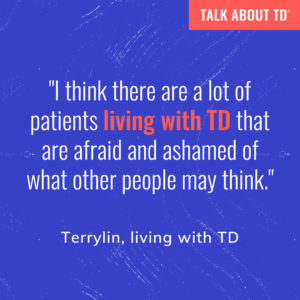Make sure to check out the November eUdpate
Last week we celebrated World Mental Health Day, a chance for communities to unite and fight the stigma surrounding mental health conditions. DBSA encouraged members of our community to take time to speak up and let people who live with depression or bipolar know that they are not alone. Voices from our community have the power to increase awareness, change the perception about mental health conditions, and educate others. DBSA is committed to amplifying your voice. We provide you the resources and platforms to tell your story and inspire others. In this eUpdate, see what opportunities DBSA and the community are taking to speak up for mental health and what you can do to have your voice heard
A conversation about mental health and well-being in college
DBSA Young Adult Council Member, Sonam Vyas, sat down with Professor and Director of Community Medicine at Saint Louis University School of Medicine, Fred Rottnek, MD to discuss navigating college life while living with a mental health condition. Dr. Rottnek details how his experience living with major depression altered his life in college and what steps he had to take to find wellness.
Mental health and well-being in college
Tardive dyskinesia (TD) is estimated to affect at least 500,000 people in the United States
TD may be persistent and is an often irreversible, involuntary movement disorder associated with prolonged use of certain drugs, such as antipsychotics, commonly prescribed to treat schizophrenia, bipolar disorder, and severe depression. Imagine a patient who is struggling to control their mental health and then is faced with excessive blinking; uncontrollable lip-smacking; trunk or hip rocking; tongue darting or protrusion; twisting or dancing fingers or toes; jaw distension, chewing or grimacing. The stigma patients with TD may encounter can impact their lives socially, physically and emotionally, making them feel embarrassed or judged by others and, in some cases, leading them to withdraw from society and isolate themselves from the outside world.
It is important for the community to recognize these patients and the broader impact of mental illness. To learn more about TD and ways to open up a conversation about the condition, visit www.TalkAboutTD.com.
Ask the Doc
Access to care helps the individual and the whole community
A significant pillar of DBSA advocacy is supporting access to quality mental health care services and products. We recently sent a letter to Governor Bill Lee of Tennessee sharing our concerns about a proposed Medicare waiver for TennCare that would affect over 1 million Tennesseans the program covers. Below are some key points we made in that comment letter:
- Mood disorders combine to cost $23 billion in work absenteeism and account for 90 percent of the nation’s suicides. Yet, these conditions are highly treatable.
- While depression is a leading cause of disability in the United States, one study showed disability days for people experiencing severe depression are reduced by 36% once they improve and those experiencing moderate depression saw a reduction in disability days by 72%.1
- Investing in mental health is sound fiscal policy. Every $1 invested in expanded treatment for depression and anxiety leads to a $4 return in better health and enhanced labor participation and productivity.2 Additionally, the presence of active behavioral health treatment can reduce a patient’s overall medical costs by 17%.3
- When treating mood disorders, one size does not fit all. DBSA encouraged TennCare to provide beneficiaries a clear appeals process and consumer protections for any changes made to their prescription drug formulary.
In closing, DBSA asked the Governor to reconsider the proposed TennCare block grant proposal.
Support access to quality mental healthcare
Parent and Caregiver Corner
Settling into the School Year
October brings the reality of seasonal changes. Cooling weather, more obligations, and changing leaves lead us into the school year. With the first weeks of school behind us, we think about the wellness strategies that serve an important foundation for families as the demands of the school year continue.
Sleep
Have the days seemed shorter? With the changing weather and shorter days, sleep hygiene is ever important. Setting consistent times to go to bed and wake each day (even on weekends) help to maintain our regular circadian rhythms. Keeping consistent about sleep makes for good, well-rested starts to the days.
Homework
Has homework time also become argument time in your house? Getting kids and teens to focus on schoolwork after a long day can be a challenge. Think about creating a special location at home for your child to complete their homework. By maintaining a consistent time and place for homework, the process will become more routine and less difficult to enforce over time. Even on days when your child doesn’t have homework, think about using that space and time for other quiet activities such as reading or coloring sheets.
Mood Tracking
Monitoring your child’s mood can be a good habit to get into no matter what time of year. If your child is living with a diagnosis of depression or bipolar, keeping close tabs on their mood—especially during seasonal changes, will be informative to you as you continue to pursue the treatment options that work for you and your family. The daily records will be informative as you continue to seek solutions to keep good habits going.
Stress Management
Demanding school days can be stressful for everyone. Identify activities that help you and your child reduce stress. There are many different activities you might use, including quick mindfulness meditation, quiet time in a bedroom, dancing to a favorite song, taking a walk, or writing how you feel. Think about ways that stress-reduction activities can be incorporated into your daily life.
Support for Parents
Remember that parents need support, too. Parenting can be difficult without additional challenges. If your child is experiencing a mood disorder, remember that you are not alone. DBSA’s Balanced Mind Parent Network is an online community of individuals who share and want to support your experience.
Seasonal Affective Disorder
Seasonal Affective Disorder (SAD) is a type of depression that generally occurs because of change in season. It usually affects people during the fall, in winter months, and dissipates during the spring and summer.
Learn more about SAD
Wellness Tips
Do your best
Striving to be perfect is not healthy because perfection is not possible. Instead, focus on the things you have already accomplished and always put your best foot forward.
Speak up
Tell your loved ones, support group or health care provider if you are feeling overwhelmed. Let them know what they can do to help you.
Get involved
Find something you are passionate about in your community and volunteer. Being active in your community can create a new support network.
Thriving with Bipolar
Tell Your Story — Life Unlimited
Each month, DBSAlliance.org features new, empowering stories of individuals whose lives have been touched, but not limited by, a mood disorder. Our hope is to provide inspiration to individuals living with depression or bipolar disorder—to acknowledge that, though there may be dark times, there is also hope, and we are not alone.
We want to feature more stories from you!
Superfoods For Better Moods — And Less Depression



